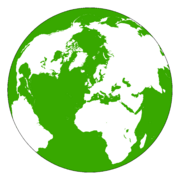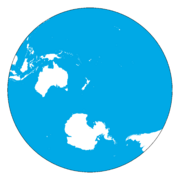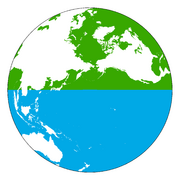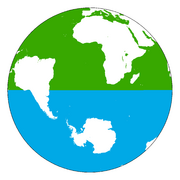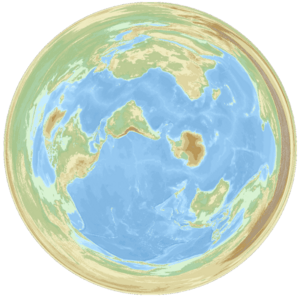Land and water hemispheres facts for kids
The land hemisphere and water hemisphere are two special halves of Earth. The land hemisphere is the half of our planet that has the most land. The water hemisphere is the half that has the most ocean.
These two hemispheres are opposite to each other. This means they do not overlap at all. If you could split Earth into these two halves, one would have most of the continents, and the other would have most of the oceans.
Scientists have figured out where the center of each hemisphere is. The center of the land hemisphere is near Nantes, France, at 47°13′N 1°32′W / 47.217°N 1.533°W. The center of the water hemisphere is exactly on the opposite side of the Earth. It is near New Zealand's Bounty Islands in the Pacific Ocean, at 47°13′S 178°28′E / 47.217°S 178.467°E.
There are slightly different ways to figure out these centers. For example, another way places the land hemisphere's center near Piriac-sur-Mer, France, at 47°24′42″N 2°37′15″W / 47.411667°N 2.620833°W. Its opposite point, the water hemisphere's center, is also near the Bounty Islands, at 47°24′42″S 177°22′45″E / 47.411667°S 177.379167°E.
The oceanic pole of inaccessibility, also called Point Nemo, is a very remote spot in the ocean. It is known as a "spacecraft cemetery" because old satellites are sometimes crashed there. This point is located at 49°01′38″S 123°26′04″W / 49.0273°S 123.4345°W.
Contents
Land and Water Across the Globe
The land hemisphere contains most of the world's land. About 80.1 percent of all land on Earth is in this half. This includes almost all of Asia, and most of South America. Continents like Africa, Europe, and North America are completely within the land hemisphere.
Even though it's called the "land hemisphere," it still has more water than land. About 53 percent of this hemisphere is water, and 47 percent is land. This hemisphere is also where most of the world's people live. It also has many large inland water bodies. These include the African Great Lakes, the Caspian Sea in Eurasia, the Great Lakes in North America, and Lake Baikal in Siberia.
The Water Hemisphere's Features
The water hemisphere has much less land, only about one-fifth of the world's total. The land it does have includes islands like Easter Island and the Hawaiian Islands. Other Pacific islands, parts of Maritime Southeast Asia, and the southern tip of the Malay Peninsula are also here. The Ryukyu Islands, Taiwan, and the southern part of the Americas (like Chile and Argentina) are also in this hemisphere.
Continents like Antarctica and Australia are entirely within the water hemisphere. Zealandia, a mostly submerged continent, is also here. Antarctica gives the water hemisphere most of Earth's ice.
Most of the Pacific Ocean and the Indian Ocean are in the water hemisphere. The entire Southern Ocean is also part of it. This hemisphere is mostly water, about 89 percent. Only about 6 percent is dry land, and 5 percent is polar ice cap (ice).
Land Area by Continent
The table below shows how much land area each continent has in both the land and water hemispheres. These numbers are estimates made by Alphonse Berget.
| Continent | Land hemisphere km2 (sq mi) |
Water hemisphere km2 (sq mi) |
|---|---|---|
| Africa | 29,818,400 (11,512,949) | 0 (0) |
| Americas | 34,955,670 (13,496,460) | 3,391,010 (1,309,276) |
| Antarctica | 0 (0) | 13,120,000 (5,065,660) |
| Asia | 40,897,241 (15,790,513) | 3,245,649 (1,253,152) |
| Europe | 9,732,250 (3,757,643) | 0 (0) |
| Oceania | 0 (0) | 8,958,630 (3,458,946) |
| Total land area | 115,403,561 (44,557,564) | 28,715,289 (11,087,035) |
See also
 In Spanish: Hemisferios continental y oceánico para niños
In Spanish: Hemisferios continental y oceánico para niños
 | John T. Biggers |
 | Thomas Blackshear |
 | Mark Bradford |
 | Beverly Buchanan |


